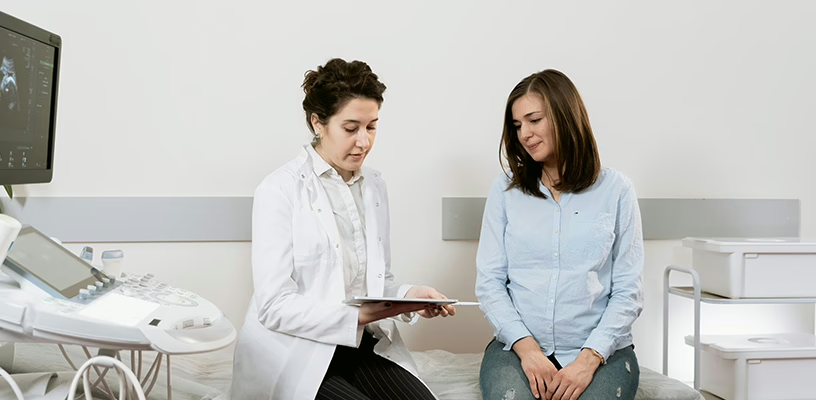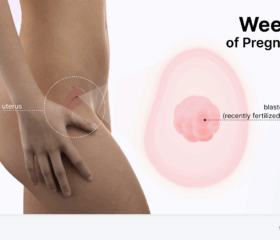What’s a Cryptic Pregnancy and How Do You Know If You Have One?
While the signs of pregnancy usually become recognizable early on, it’s possible to be pregnant without even knowing it. This is known as having a “cryptic pregnancy.”

It makes sense if you’re wondering how cryptic pregnancies can happen. Between morning sickness, hormone-induced mood swings, and pregnancy-induced bloating, most expectant mothers are keenly aware of the life growing within them.
Let’s explore what causes cryptic pregnancies, how you can tell if you have one or not, and what you should do if you discover that you do.
What is a cryptic pregnancy?
Again, a cryptic pregnancy, also known as a stealth or denied pregnancy, is when a woman is pregnant without knowing it.
While they might seem strange, cryptic pregnancies are more common than you may realize. They can last for a long time; 1 in 475 pregnancies aren’t caught until the 20th week, while around 1 in every 2,500 pregnancies aren’t discovered until full term. 1
What’s the difference between cryptic and phantom pregnancies?
You might have heard of another phenomenon known as a phantom pregnancy. This is a psychological condition where you become so convinced that you’re pregnant that you even start to have early pregnancy symptoms (e.g., nausea or a missed period).
Unlike with a cryptic pregnancy, however, you aren’t actually pregnant. If you were to take a pregnancy test, it would come back negative.
Are you at risk of a cryptic pregnancy?
Cryptic pregnancies can happen to anyone, especially since every woman experiences pregnancy differently. The signs of pregnancy vary from person to person, and you may not even have any symptoms at all. 2
Even if you do have symptoms, it’s sometimes possible to miss them. For example, if you’re obese, you might not notice that you’re gaining weight.
Plenty of other factors may make it difficult for you to realize that you’re pregnant, too. They include:
Irregular periods
For many women, missing a period is an obvious sign of pregnancy. However, tracking your menstrual cycle isn’t easy if you have irregular periods. According to the American Academy of Family Physicians (AAFP), between 9% and 14% of women have irregular periods that fall outside of the 21- to 35-day cycle. 3 Some of those women are accustomed to their menstrual cycles skipping a month or two (with no period at all).
Several conditions can affect your hormone balance and reproductive system, causing irregular periods. You might get them if you’re dealing with: 4
- Polycystic ovary syndrome (PCOS)
- Premature ovarian insufficiency (POI)
- Pelvic inflammatory disease (PID)
- Endometriosis
- Uterine fibroids
- Perimenopause 5
You may also get irregular periods if you’re overweight or underweight, have an eating disorder or otherwise don’t eat enough calories, or exercise excessively. 6 7
It’s possible to get pregnant if you have irregular periods, but they make it easy to get caught off guard with a cryptic pregnancy. Since a “missed period” might not be able to guide you, you’ll need to look out for other signs of pregnancy when you have irregular periods (e.g., other early pregnancy symptoms).
Unusual timing of conception
If you’ve been tracking your cycle and you’re sure you didn’t have sex during your fertile period, it might be hard to believe you became pregnant.
However, it’s possible to conceive even when you aren’t ovulating (or due to ovulate shortly). In fact, although it’s rare, it’s even possible to get pregnant on your period if you have a shorter menstrual cycle (less than 21 days) or if you have a longer period that lasts 7 days or more. This timing increases the sperm’s chances of surviving long enough to fertilize the egg.
Confusing symptoms
Unfortunately, many pregnancy symptoms are very similar to the symptoms of premenstrual syndrome (PMS), including:
- Breast pain and tenderness
- Mood swings
- Fatigue
- Nausea
- Changes in eating habits
- Cramps
Watch out for loose stools, too. Diarrhea can be a sign of pregnancy and PMS. You might also have light spotting, which can sometimes look like your period. 8
There are also more than a few illnesses that can cause the same symptoms most women experience early on in the first trimester. It’s easy to mistake nausea and vomiting for a stomach bug, fetal movement for gas or indigestion, fatigue for burnout from overworking, and so on.
Recent pregnancy
You can get pregnant as early as three weeks after giving birth—even if you’re breastfeeding and haven’t had your first postpartum period yet. 9
When your pregnancies are so close together, you might struggle to distinguish between postpartum and prenatal symptoms.
For example, your breasts become larger and more sensitive if you’re breastfeeding, which can also happen if you’re pregnant again and your body’s preparing to breastfeed yet another baby. 10
False negative pregnancy test results
Pregnancy tests are generally very reliable, but they do sometimes return false negative results. A false negative can easily lead to a cryptic pregnancy.
You might get a false negative result if you drink too much water before taking the test and dilute your urine. If you take the test too early, use an expired test, or make mistakes when following the directions, that can have the same effect (or lead to an ambiguous result, like a faint line on your pregnancy test).
Sometimes, surprisingly, it’s also possible to get a false negative or an unclear result because your hormones were actually too high. This phenomenon is known as the “hook” effect—if your hCG (hormone) levels are very high, it can overwhelm store-bought pregnancy tests. 11
Psychological effects (denying your pregnancy)
Sometimes, cryptic pregnancies have psychological causes, not physical ones (i.e., not just confusing symptoms). If you weren’t planning on getting pregnant and don’t want a child, or, conversely, if you’ve struggled with infertility in the past and didn’t want to get your hopes up, you might ignore your body’s signs.
Other psychological factors, including mental health issues, societal stigmas surrounding sex, and past sexual trauma, can also cause women not to recognize or acknowledge that they’re pregnant.
You can become pregnant even if you’re using birth control
If you’re consistently using contraceptives, such as condoms, it’s understandable if the chance of getting pregnant isn’t even a thought in your mind. However, it bears remembering that no birth control method is 100% effective (although some get close), and it’s hard to achieve “perfect use” in real life by following the instructions perfectly every time.
How can a cryptic pregnancy affect your health?
You won’t be able to prepare for pregnancy, delivery, or motherhood if you don’t know that you should be preparing in the first place. Pregnancy can be rough on your body, and navigating it requires medical attention and certain lifestyle adjustments.
Without this, your health—and the health of your baby, if you carry him to term—will be at risk.
Lack of prenatal care
If you realize too late that you’re pregnant, you’ll miss out on the important prenatal checkups that monitor the health of both you and your baby.
Your doctor uses these appointments to detect potential complications, such as gestational diabetes and preeclampsia, and provide guidance on your nutrition and life habits. For example, your doctor will advise you on what prenatal vitamins you need to support your health and fetal development during pregnancy.
Getting enough vitamins and nutrients can reduce the risk of birth defects in the brain, spinal cord, and skull while helping your body fight off harmful bacteria and viruses. 12 13
Exposure to harmful substances
You might continue to indulge in harmful habits if you don’t know you’re pregnant. In particular, if you smoke or drink, you might not realize in time that you need to quit those (or at least take a break).
Smoking can damage your baby’s lungs and brain, slow fetal growth, and cause premature delivery and low birth weight while raising the risk for birth defects like a cleft lip and cleft palate. 14 Alcohol is just as dangerous, contributing to: 15 16
- Miscarriage
- Stillbirth
- Preterm labor
- Sudden infant death syndrome (SIDS)
- Fetal alcohol spectrum disorders (FASDs)
Recreational or medicinal drugs (prescribed or not) can also affect pregnancy. For example, smoking marijuana has much the same consequences on fetal growth and brain development that smoking does.
Certain blood pressure medications like angiotensin-converting enzyme inhibitors (ACEi) and angiotensin receptor blockers (ARBs) can also cause fetal skull defects, limb abnormalities, and cardiovascular issues. 17
Unattended labor and delivery
If you’re unprepared for labor, you may be left without proper medical attention when your baby comes. Unattended or unassisted birth can have disastrous effects, like severe blood loss, infection, birth injuries, and even death (for either you or your baby). 18
Without proper help, your baby will miss out on important post-delivery testing. This includes the Apgar score or Apgar test, an important evaluation that doctors, nurses, and midwives use to determine a newborn’s overall health
Doctors usually perform this test one minute after birth, again at five minutes, and in some cases, again after ten minutes. They’ll assess your baby’s: 19
- Breathing
- Heart rate
- Muscle tone
- Reflexes
- Skin color
Newborn screening can detect health concerns, even in seemingly healthy babies, so it’s very important.
What should you do if you suspect a cryptic pregnancy?
By definition, if you have a cryptic pregnancy, you don’t know you’re pregnant. By reading this article, you’re already informing yourself, which is a great start.
The best way to ensure you don’t have a cryptic pregnancy is to talk to your doctor if you have any unusual changes in your body or otherwise have reason to suspect you might be pregnant.
If you’ve had a negative pregnancy test but still aren’t convinced, a blood test performed by a doctor is a surefire way to figure out if you’re pregnant. They’re more accurate than at-home urine tests since there’s less chance of human error, and they can detect lower hCG levels. 20
How to cope if you do have a surprise pregnancy
Finding out that you’re pregnant can be overwhelming, especially when it’s unexpected or unplanned. It’s normal to feel shock, confusion, or even guilt.
Talk to your partner, family, friends, or a therapist to process your emotions and develop a plan for your future. Consider joining a support group—in real life or online—for women with unexpected pregnancies. Whether you keep the baby or not is up to you, and talking over that decision with someone else will probably help.
Alongside your mental health, be sure to pay attention to your physical well-being, too. Do this by:
- Seeking immediate prenatal care: Schedule an appointment with a doctor or midwife as soon as you confirm your pregnancy. During your appointment, your doctor will identify your baby’s gestational age with an ultrasound and start tracking her development
- Assessing your health: If you take any medications or have a pre-existing medical condition with implications for your pregnancy, speak with your doctor to find out how to mitigate any potential complications.
- Making healthy lifestyle changes: If you’re planning on birthing the baby (i.e., you aren’t considering an abortion), now’s the time to shift to a more appropriate pregnancy diet, start taking your prenatal vitamins, and cut out harmful substances like alcohol and tobacco.
Again, if you feel overwhelmed, check out which pregnancy resources are available in your area, whether that means parenting classes, financial assistance programs, or something else.
Final thoughts
Even if you know your body well, pregnancy can sometimes still sneak up on you. Again, a surprising number of women don’t realize they’re pregnant until they go into labor, so don’t be too hard on yourself if you get caught off-guard.
Think positive—while a cryptic pregnancy can be a jarring surprise, you have plenty of options.
Article Sources
- Nova Southeastern University. "Denial of Pregnancy or Cryptic Pregnancy" Retrieved April 17, 2025.
- Eunice Kennedy Shriver National Institute of Child Health and Human Development. "What are some common signs of pregnancy?" Retrieved April 17, 2025.
- American Family Physician. "Evaluation and Management of Abnormal Uterine Bleeding in Premenopausal Women" Retrieved April 17, 2025.
- Texas Children’s. "Menstrual Irregularities" Retrieved April 17, 2025.
- Cleveland Clinic. "Perimenopause" Retrieved April 17, 2025.
- Nemours® KidsHealth®. "Irregular Periods" Retrieved April 17, 2025.
- National Eating Disorders Association. "Warning Signs And Symptoms" Retrieved April 17, 2025.
- University of Nebraska–Lincoln. "Pregnancy Test Resources" Retrieved April 17, 2025.
- National Health Service. "Sex and contraception after birth" Retrieved April 17, 2025.
- Johns Hopkins Medicine. "Breast Pain: 10 Reasons Your Breasts May Hurt" Retrieved April 17, 2025.
- Clearblue. "Hook effect in pregnancy test results: Understanding this rare false negative" Retrieved April 17, 2025.
- Penn Medicine Lancaster General Health. "Everything You Need to Know About Prenatal Vitamins" Retrieved April 17, 2025.
- Centers for Disease Control and Prevention. "Vitamin & Mineral Nutrition for Healthy Growth and Development" Retrieved April 17, 2025.
- Centers for Disease Control and Prevention. "Health Effects of Cigarettes: Reproductive Health" Retrieved April 17, 2025.
- Centers for Disease Control and Prevention. "Alcohol Use Effects on Men's and Women's Health" Retrieved April 17, 2025.
- Centers for Disease Control and Prevention. "Alcohol Use, Screening, and Brief Intervention Among Pregnant Persons — 24 U.S. Jurisdictions, 2017 and 2019" Retrieved April 17, 2025.
- Medicine (Baltimore). "Use of angiotensin II receptor blocker during pregnancy" Retrieved April 17, 2025.
- Pregnancy, Birth and Baby. "What is freebirth?" Retrieved April 17, 2025.
- MedlinePlus. "Apgar score" Retrieved April 17, 2025.
- The Well by Northwell. "How Accurate Are Pregnancy Tests?" Retrieved April 17, 2025.







